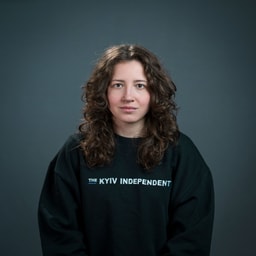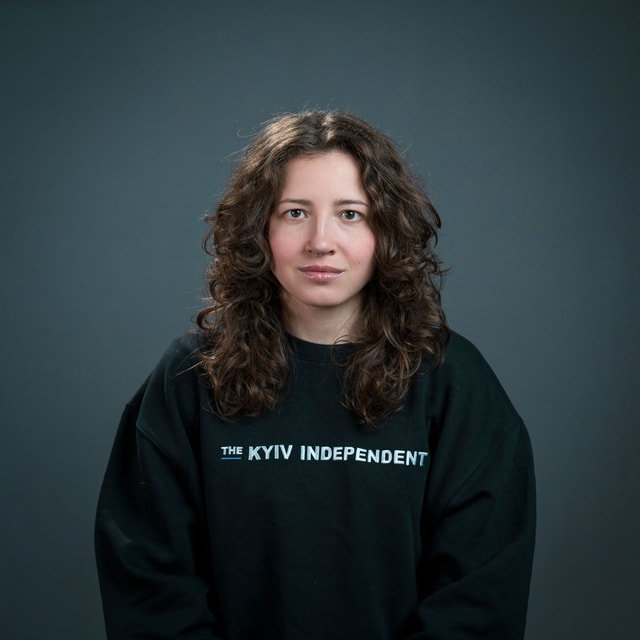Ukraine’s envoy to UN: Entire world complicit in allowing Russia’s unlawful behavior for 30 years
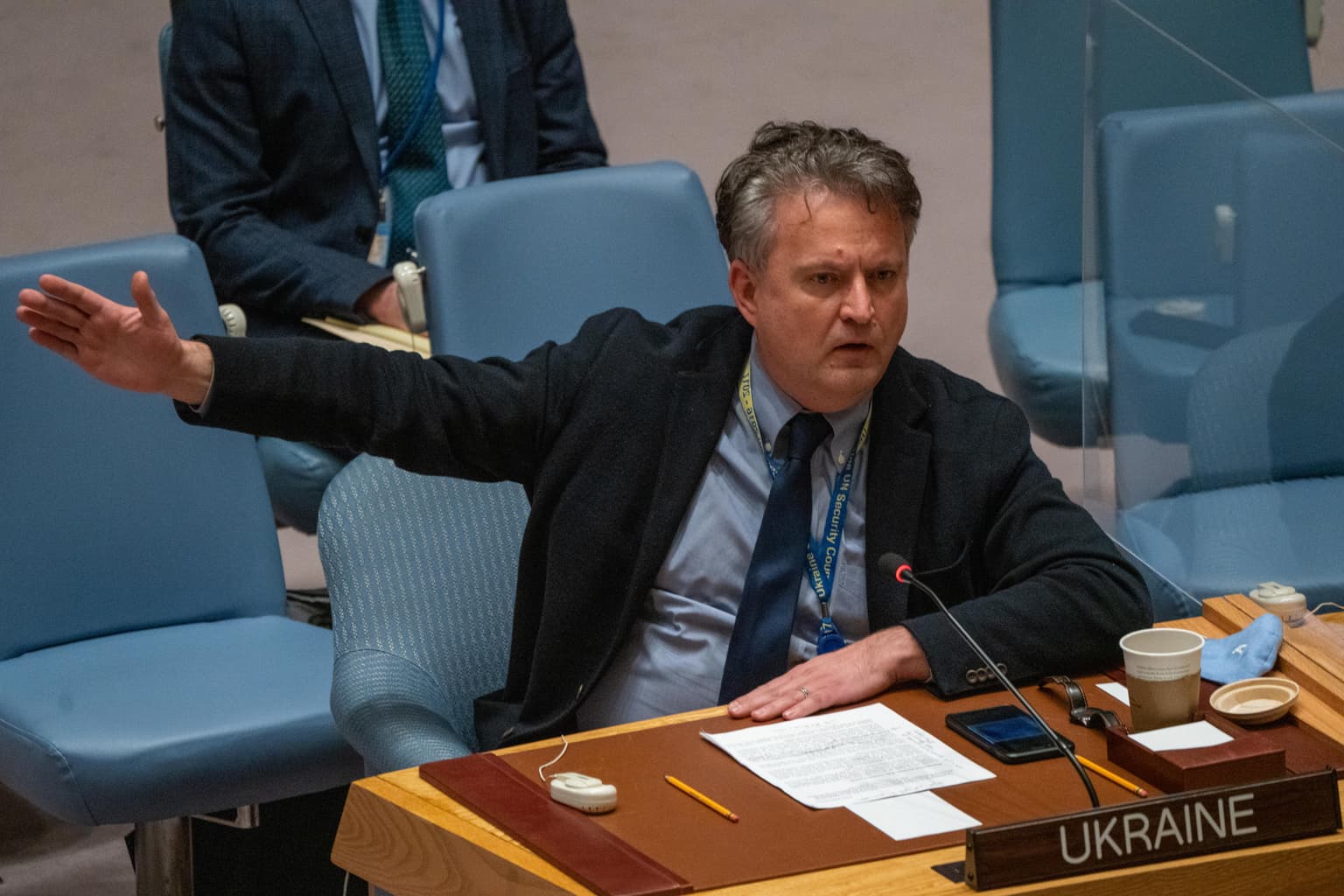
Editor’s Note: This interview has been edited and condensed for clarity.
NEW YORK CITY – Ukraine’s Permanent Representative to the United Nations Sergiy Kyslytsya learned of Russia’s all-out war against his country in the middle of a UN Security Council session.
When Russian tanks rolled into Ukraine and rockets started raining down on Ukrainian cities around 5 a.m. Kyiv time, it was late evening in New York, where the UN is headquartered.
Kyslytsya quickly changed his prepared statement, telling the Russian ambassador to call his capital and find out what was happening. He also called Russia’s actions a war, refusing to use Moscow’s dubious phrasing “special military operation,” which many echoed in the early hours of the invasion out of confusion.
“Even when we realized that it was not even imminent, it was already happening, some of the countries continued to read their prepared statements,” Kyslytsya recalls. “The situation was very dramatic, and I think that the Secretary-General (Antonio Guterres) himself was deeply shocked that night.”
Kyslytsya is a career diplomat who has held a number of titles including Deputy Foreign Minister of Ukraine. Since 2019, he has headed Ukraine’s mission to the UN.
Since Feb. 24, Kyslytsya has gained wide international recognition for his pungent statements about Russia, in tune with a new bold style of Ukrainian diplomacy exercised by President Volodymyr Zelensky and Foreign Minister Dmytro Kuleba.
The Kyiv Independent spoke with the ambassador at the Permanent Mission of Ukraine to the UN in New York. As Kyslytsa entered one of the meeting rooms, where the interview was conducted, he placed the UN Charter on the table, which he says he carries with him at all times.
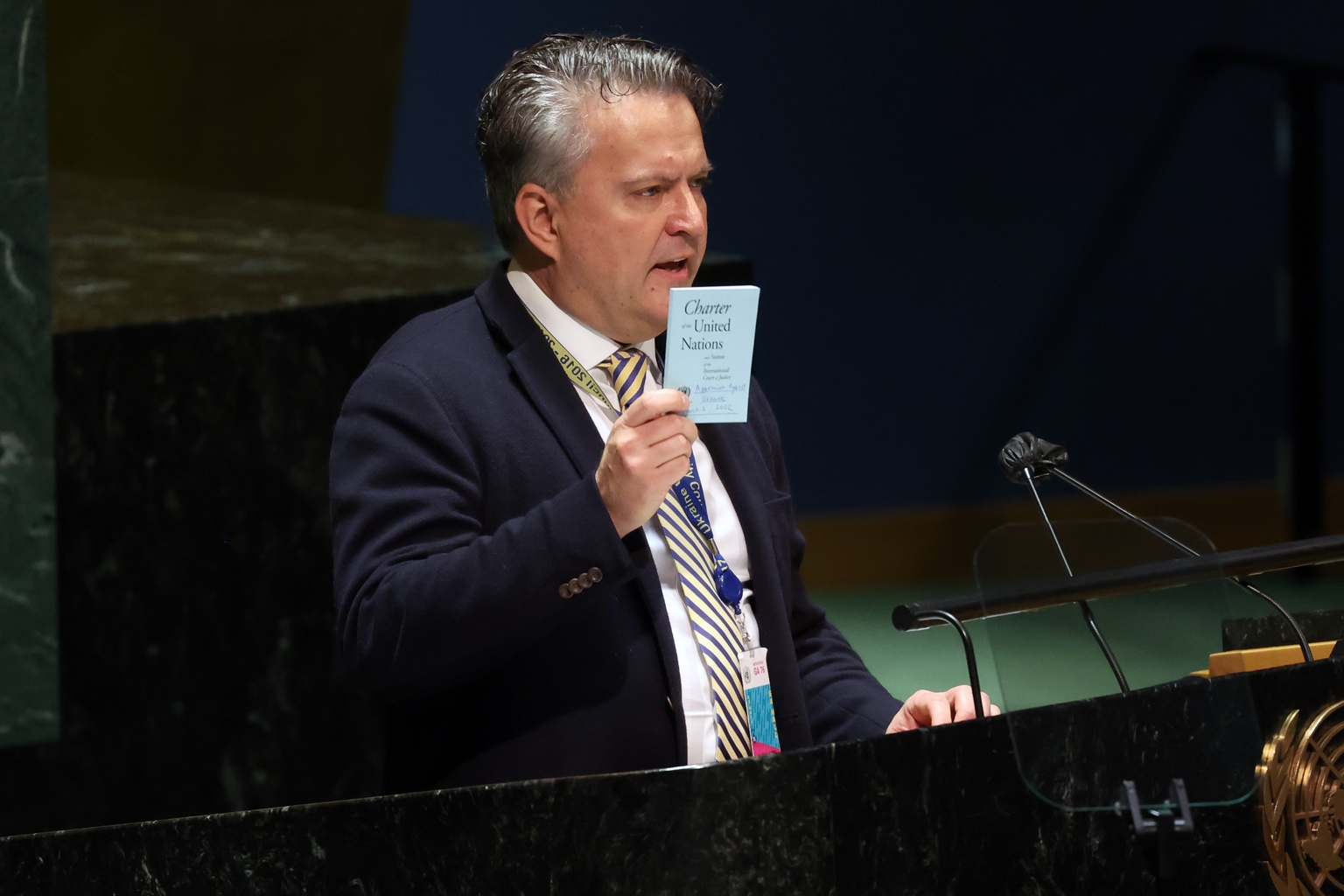
Sergiy Kyslytsya, Ukraine's ambassador to the United Nations holds up the United Nations Charter as he speaks at the UN General Assembly special session on March 2, 2022, in New York City. (Photo by Spencer Platt/Getty Images)
The Kyiv Independent (KI): You have known about the threat of the all-out Russian war well in advance. Were there any signs pointing to the looming invasion inside the UN?
Sergiy Kyslytsya (SK): Well, of course, I didn’t know more than my (Foreign) Minister and Ukrainian intelligence. Whatever I might have known was rather my reading of the situation based on my experiences, interactions with Russians and some other parties concerned here, in New York.
(Russia’s Ambassador to UN Vasily) Nebenzya was away for most of January in Moscow. It’s unclear whether he was in Moscow purely on holidays or if he was there for preparation and indoctrination by his superiors before the attack on Ukraine. When Nebenzya came back, in spite of the fact that February was the month when Russia was presiding in the Security Council, he was absent for most of it. Allegedly he had Covid-19.
Instead, it was his deputy (Dmitry) Polyanskiy and Deputy Foreign Minister (Sergey) Vershinin, who was sent to New York to preside over some of the meetings of the Security Council. It was interesting because Vershinin is not in charge of multilateral diplomacy, he is not in charge of any work related to the UN. He has an entirely different portfolio related to the Middle East.
I already suspected Nebenzya was trying to avoid exposure before something major happened, or he knew something would happen. Because imagine him sitting in the meetings, and him personally saying every day: “We will not invade,” and then on the night of the invasion everybody says to him: “What the hell, ambassador? You were telling us all January and February the invasion would not happen.”
I also tend to believe Americans, based on my education and based on my experience working in the U.S. So when they kept saying every other day, “the invasion is imminent,” I really believed it would happen.
KI: Was the mood, in general, one of skepticism about Ukraine’s ability to resist?
SK: I think that the most determined and confident nations were the U.S., the U.K., and the Baltic states. But even they underwent a very dramatic upgrade of their belief in us after a couple of weeks since the invasion. They saw that the Ukrainian military, the Ukrainian people, and President Zelensky himself were very determined, and I think that the decision by the president and his team not to evacuate and to stay in the capital had a fundamental psychological effect not only on governments but also on the perception among the public.
KI: You learned that the further invasion started during a General Assembly session and had to change your prepared statement in the process. When you were addressing the Russian delegation, you made it clear it was a war, refraining from calling it “a special operation,” the way Russia presented it.
SK: It is very important to use the right language and the right definitions, as Russians are very particular about using the language of choice. They constantly say “a special operation” for many, many reasons. They also have no flexibility. They come with prepared statements, and they rarely change them. We may hate them for what they are, but we must acknowledge that they are very well-prepared officials.
KI: What has it been like to interact with the Russian delegation, knowing that their country is killing Ukrainians en masse every day?
SK: Many people would think that the natural reaction is to become very emotional and start trembling, but I think I have enough experience to understand that to keep your composure and not engage emotionally with whatever lies they may say is the only right thing to do. Your duty in the Security Council Chamber is not to be dramatic like you’re on stage. Your duty is to listen very carefully to what they say and either reply immediately or follow up later on.
The thing is, the Security Council is a formal setting where everything said goes on the record. Therefore, I think that the irony of what the Russians say in the Security Council will eventually boomerang on them because all these records will be used against them in future legal proceedings – in national courts, or an international tribunal, if it is set up. It’s good that they continue to show up. It is very important that they come, say all those lies, and that they’re put on record.
I think that Nebenzya and his henchmen should have no doubts, and I’m sure they have no doubts, that they will be at least brought to court proceedings as witnesses or probably as suspects or accomplices to the crimes. So even if many people are disappointed when it comes to the Security Council, it still has this important role to play because it’s kind of a pretrial. And it is also important that the Security Council, unlike the North Atlantic Council of NATO, unlike the Permanent Council of the OSCE, unlike the Committee of Ministers of the Council of Europe, is public, because all the meetings in NATO, in Brussels, in the European Council happen behind closed doors.
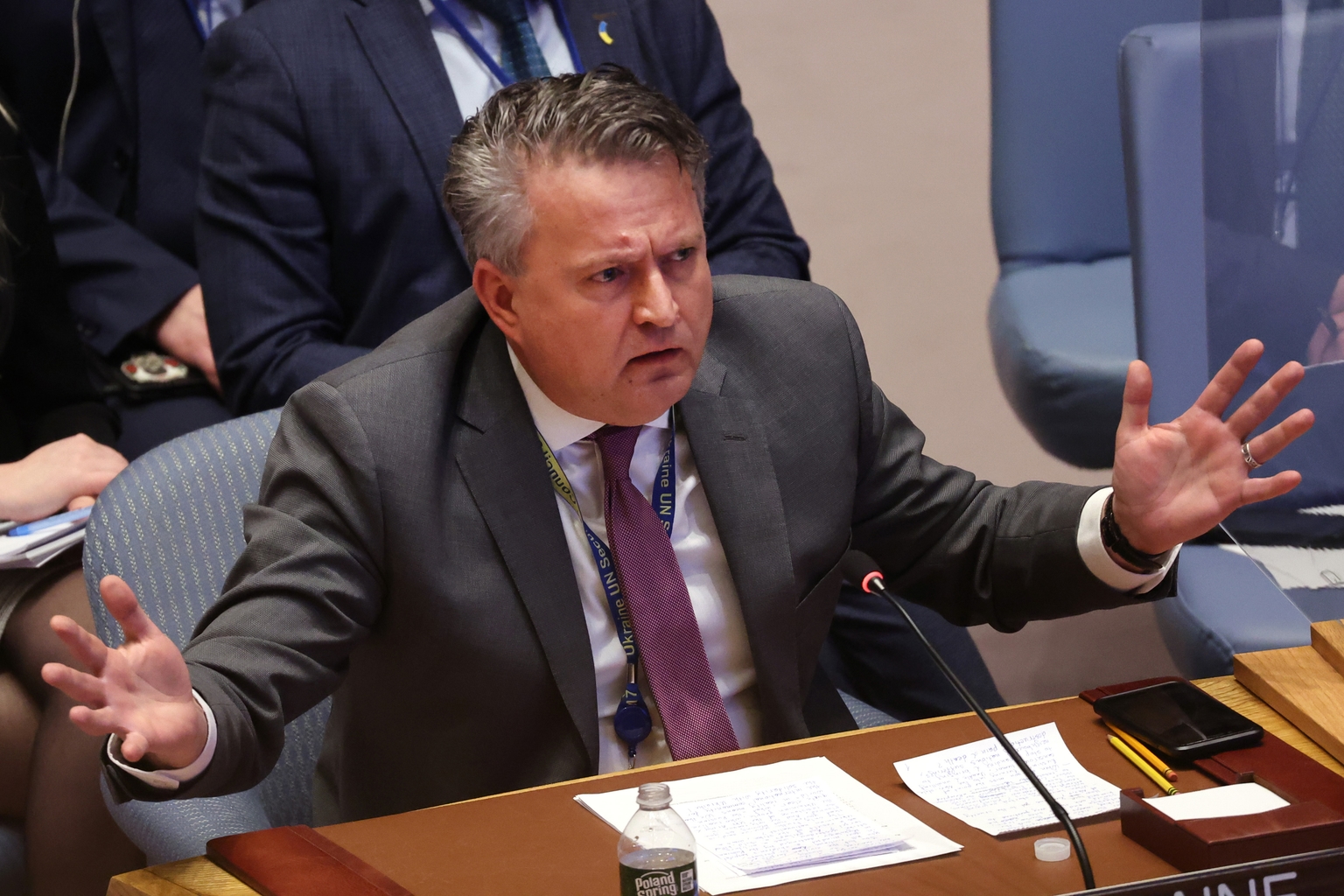
Ukrainian Ambassador to the United Nations Sergiy Kyslytsya speaks during a Security Council meeting, during which President Volodymyr Zelensky also addressed the council, on April 5, 2022, in New York City. (Photo by Spencer Platt/Getty Images)
KI: One of the issues that you always highlight is that Russia illegally occupied the Soviet Union’s seat in the Security Council. Do you see any prospects for the UN to withdraw that seat from Russia?
SK: What happened during the Soviet presidency in the Security Council in December 1991 is that the Soviet Ambassador Yuli Vorontsov informed the members of the council about the intention of the Russian Soviet Federative Socialist Republic to continue the membership of the Soviet Union in the UN and in the Security Council. It is very important. Not to be a successor state but to continue, as if the membership was uninterrupted. Then he comes in the morning, continues his functions as the president of the Security Council and says, “I am now the ambassador of the Russian Federation,” and the nameplate got changed. That was one of the most blatant violations of the fundamentals of the UN Charter.
When Federal Yugoslavia disintegrated about the same time, Serbia wanted to be its successor state. Both the Security Council and the General Assembly voted against it. They said: “No, you have to go through the application process.” So you see the double standard. Serbia had no nuclear arsenal, Russia did. So I think that the major consideration for the West in 1991 was what was going to happen to the nuclear arsenal, and who was going to guarantee to Washington, London, Beijing, and Paris that it would be under control. They were quite happy when (Former Russian President) Boris Yeltsin said: “Don’t worry, guys, I guarantee you that everything will be under control.”
KI: So do you think there is any prospect for the UN to reconsider Russia’s seat?
SK: No. As of today, there is no intention, but you have to understand my point. My point is that you could tell me 100 times per hour that you don’t intend to change the status, but it doesn’t cancel the legal qualification of what happened in December 1991.
It is a very important piece of information when, for example, you open the discussion of how it happened that Russia attacked Ukraine in 2022. It happened because from the very beginning after the dissolution of the Soviet Union, (Russia occupying the Soviet Union’s seat) was by merit a total violation of international law and the fundamentals of the UN Charter. So the very first moment of Russia’s presence in the Security Council was illegal, and that sense of being able to operate in total disrespect to the rules was repeated many, many times later on.
When Ukraine decided to join the Council of Europe, it had to comply with many pre-accession requirements. Paris, Berlin, and others decided that Ukraine could not be admitted to the Council of Europe unless Russia was joining simultaneously, or the gap (between their accessions) was very narrow. So when it became obvious that Ukraine was eligible to join, in the middle of the (First) Chechen War, Russia got an invitation too. Russia was killing dozens of thousands of its citizens, and the cradle of democracy and human rights issued them an invitation. Russia was invited to the Council of Europe amidst Chechnya, Russia remained in Transnistria, Russia invaded Georgia, Russia did and continues to do nasty things in Syria, Russia invaded Ukraine in 2014 and occupied Crimea. The whole history of the attitude of all of us, including our best allies and partners, toward Russia behaving in the international arena has been terrible for 30 years. So we were all complicit.
KI: What was the perception of Zelensky’s famous address to the Security Council when he suggested that the UN disbands if it can’t help Ukraine?
SK: I liked it when Zelensky said addressing the General Assembly that we should remember that the UN is not the building, that the UN is ourselves. Some people, including many Ukrainians, believe that the UN is a kind of separate body on its own trajectory in our universe. But the UN is what we decide, all of us. And when he addressed the Security Council, he didn’t say simply “dissolve.” He said: “Reform! And if you cannot reform – then dissolve.” I heard no rejection of his statement in the Security Council.
KI: The UN is indeed often criticized, even called dysfunctional, for having no power to enforce the implementation of its resolutions, among other things. Do you agree with such an assessment?
SK: The UN is not the Security Council. The Security Council is only a part of the whole system, although it is a very important part. There is also the General Assembly, the Secretary-General, the Economic and Social Council, and a whole family of agencies and institutions.
And of course, the global powers always maintain the position that if there is anything serious in the UN, it goes to the Security Council. And especially the Permanent Members. The Permanent Members would never allow, in the entire history of the UN, the Secretary-General to play any meaningful political role, any of them – the U.S. the U.K., the Soviet Union, China, and France. There are only five articles out of 111 about the Secretary-General in the entire Charter, and there are even fewer articles about its powers.
Let us remember that the UN, the Secretary-General, and the Security Council, were all conceived by three old gentlemen – (Franklin D.) Roosevelt, (Winston) Churchill, and (Joseph) Stalin. That’s why we often say that the UN Secretary-General is more Secretary than General.
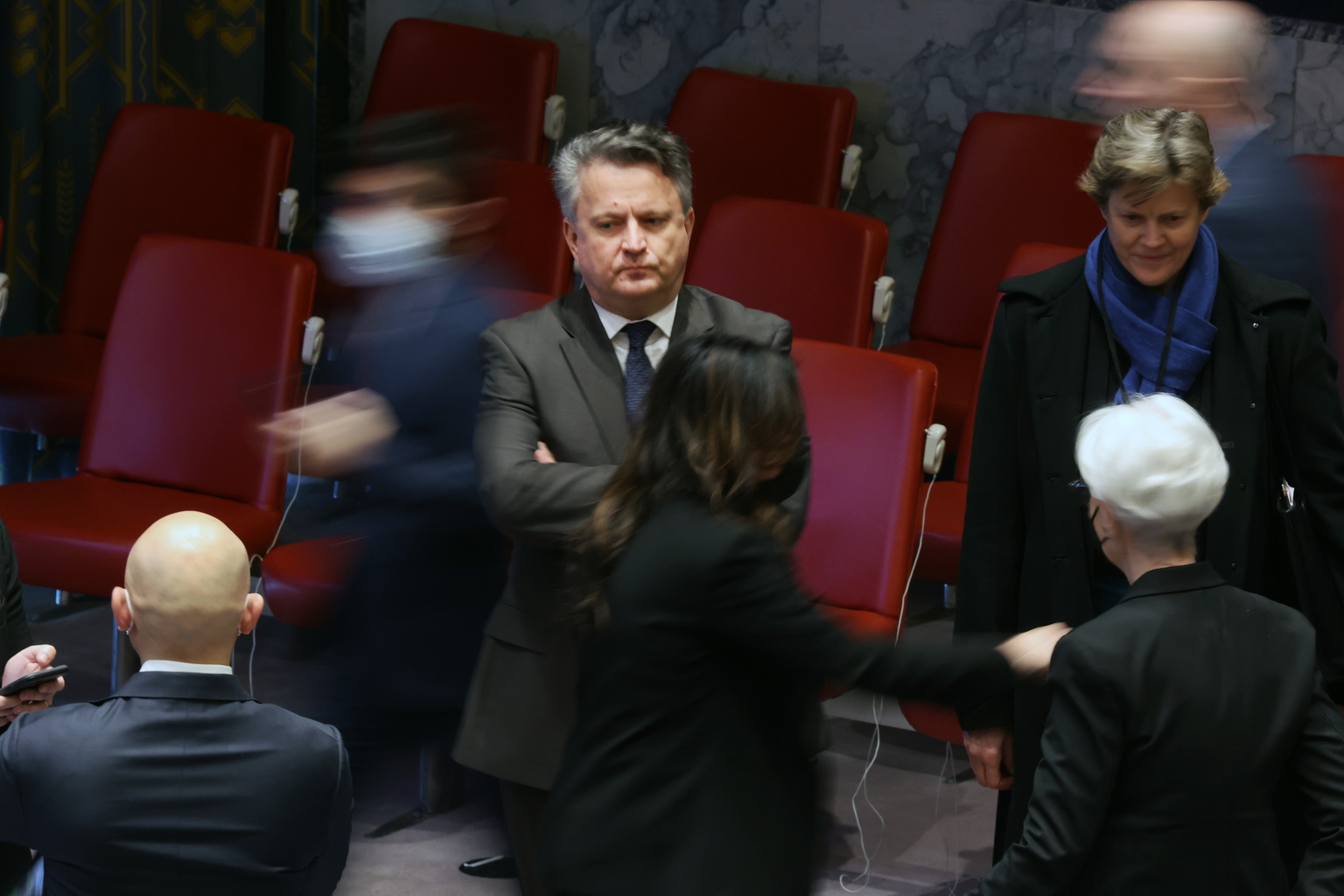
Ukraine's Ambassador to the United Nations Sergiy Kyslytsya speaks with other diplomats at the Security Council on March 29, 2022, in New York City. (Photo by Spencer Platt/Getty Images)
KI: Still, some say that the UN ultimately failed its main function to prevent another war.
SK: The Security Council did fail. It failed because it was immobilized by a country that was allowed to be called a permanent member and by virtue of its status to veto whatever decisions the Security Council may want to make.
But not the General Assembly. It acted bravely and decisively. It voted with an unprecedented number of votes, 141 votes, on March 2 and declared that Russia was launching aggression. The General Assembly voted with 140 votes on March 24 on humanitarian issues. The General Assembly stripped Russia of its membership rights in the Human Rights Council. So to say that the General Assembly, to say that the collective world did not react within the scope of its statutory rights to the Russian aggression would not be true.
But I am realistic about the UN. The major (global) institutions and their powers were designed in the middle of the last century. Article 108 of the UN Charter says that it can be changed by a vote of the General Assembly, preceded by a vote of the Security Council. When three gentlemen (Stalin, Churchill, Roosevelt) in Yalta were deciding on the major design, they designed it in a way that would guarantee the Permanent Members the controlling power over everything. So when we speak about reform, we should primarily address our questions to the permanent members. Because until they agree on changes, the Charter, as it is designed and ratified, does not allow for any change.
KI: So when Zelensky invites nations to meet in Kyiv after the war is over and redesign the security architecture of the world, is that nothing but wishful thinking?
SK: No, no, no. First of all, to capitulate in the face of a difficult situation – that is irresponsible, and every responsible leader should speak up and remind us of the need to review the global security architecture, to acknowledge that it does not work when countries like Russia totally disregard all rules and norms.
So we have the option to pretend that nothing happened again, or we can have a sincere conversation with responsible world leaders. It doesn’t mean that they will immediately or in the near future arrive at a conclusive decision on what to do about the security architecture, but it is the duty of responsible leaders to discuss it.
KI: Do you think that Ukraine is capable of leading the way there?
SK: To say that Ukraine changes the world of the 21st century is not an overstatement. Russia’s actions proved even to its situational allies that they are totally unprotected. In a system where international laws, rules, and norms are not respected, maybe 160 out of 193 members of the General Assembly will never have powerful armies or economies to be able to protect themselves militarily, and economically if Russia behaves as it behaves.
Therefore, believe it or not, there is a palpable feeling that after Feb. 24, the number of countries that are afraid of their own destiny and their feeling of being unprotected is there. You can see it in conversations, you can see it in how they voted on March 2. Because when you receive 141 votes, and Russia is supported only by four countries – there were only five countries including Russia itself that voted against – it demonstrates how disgusted the international community was with their actions.
I believe that Ukraine will be in the books of law and history as the country that changed the world in the 21st century. And it’s not a pathetic statement, it is a matter of fact. As World War II changed Europe, Ukraine changes Europe, and beyond.
____________________
Note from the author:
Hi there! It's Toma Istomina.
I hope you found this conversation with Sergiy Kyslytsya as insightful as it was for me. I recorded this interview during a work trip to New York, where I also got a chance to meet dozens of foreign diplomats who told me about reading the Kyiv Independent and thanked our team for helping them learn the truth about Russia's war in Ukraine. Being part of this news outlet and its effort has been a great privilege for me. I hope we can carry on with your support. Please consider donating to the Kyiv Independent and becoming our patron to help us tell stories that matter. Thank you!
